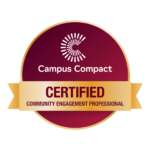Glossary of Campus Engagement Terms
Below you will find definitions to help understand and educate professionals interested in service-learning, civic engagement and the scholarship of engagement.
What is Service-Learning?
Service-learning means a method under which students learn and develop through thoughtfully organized service that: is conducted in and meets the needs of a community and is coordinated with an institution of higher education and with the community; helps foster civic responsibility; is integrated into and enhances the academic curriculum of the students enrolled; and includes structured time for students to reflect on the service experience.
American Association for Higher Education (AAHE): Series on Service-Learning in the Disciplines (adapted form the National and Community Service Trust Act of 1993)
Service learning is a credit-bearing, educational, experience in which students participate in an organized service activity that meets identified community needs and reflect on the service activity in such a way as to gain further understanding of course content, a broader appreciation of the discipline, and an enhanced sense of civic responsibility.
Bringle, Robert and Julie Hatcher, “A Service Learning Curriculum for Faculty,” Michigan Journal of Community Service Learning, Fall 1995
Service learning is a process through which students are involved in community work that contributes significantly: 1) to positive change in individuals, organizations, neighborhoods and/or larger systems in the community; and 2) to students’ academic understanding, civic development, personal or career growth, and/or understanding of larger social issues.
This process always includes an intentional and structured educational/developmental component for students, and may be employed in curricular or co-curricular settings. Even with an expanded vision for the field, service-learning will undoubtedly continue to play a critical role in campus-community collaboration.
From Charity to Change, Minnesota Campus Compact, 1999
What is Civic Engagement?
Campus civic engagement is broadly defined as “those activities that reinvigorate the public purposes and civic mission of higher education and action by individuals and institutions to create a society characterized by justice and dignity for all.”
Bowley, Erin. The Minnesota Campus Civic Engagement Study. Minnesota Higher Education Services Office and Minnesota Campus Compact, 2003
“Civic engagement involves true partnerships, often between the institution and the community in which it resides, that serve mutual yet independent interests, thereby honoring the integrity of all parties.”
Center for Liberal Education and Engagement
“… broad, inclusive, and direct participation in the search for the public good that renews and enriches earlier conceptions of democracy.”
Center for Community and Civic Engagement, University of Southern Mississippi
“Individual and collective actions designed to identify and address issues of public concern. Civic engagement can take many forms, from individual volunteerism to organizational involvement to electoral participation. It can include efforts to directly address an issue, work with others in a community to solved a problem or interact with the institutions of representative democracy.”
The Pew Charitable Trusts
What is Community Engagement?
“Community engagement describes collaboration between institutions of higher education and their larger communities (local, regional/state, national, global) for the mutually beneficial exchange of knowledge and resources in a context of partnership and reciprocity.”
The Carnegie Foundation for the Advancement of Teaching
What is the “engaged campus”?
The engaged campus is a college or university which emphasizes community engagement through its activities and it definition of scholarship. The engaged campus is involved in community relationships, community development, community empowerment, community discourse, and educational change. Benchmarks of the engaged campus are campus-community partnerships, careful reflection, and sustained impact.
Service Matters: The Engaged Campus. Campus Compact, 1999
An engaged campus is on that is consciously committed to reinvigorating the democratic spirit and community engagement in all aspects of is campus life: students, faculty, staff and the institution itself. The engaged campus recognizes that knowledge cannot be separated from the purposes to which it is directed. The engaged campus is not just located within a community, it is intimately connected to the public purposes and aspirations of community life itself. The engaged campus in unable to separate its unique responsibility for the development of knowledge from the role of knowledge in a democratic society to form the bases of social progress and human equality.
Strategies for Creating and Engaged Campus: An Advanced Toolkit for Academic Leaders. Campus Compact, 2001
- Campus Engagement Resources
- Administrators , Community Partners , CSDs , Faculty , Presidents , Presidents/Administrators , Students
 Campus Engagement Resources
Campus Engagement Resources 

